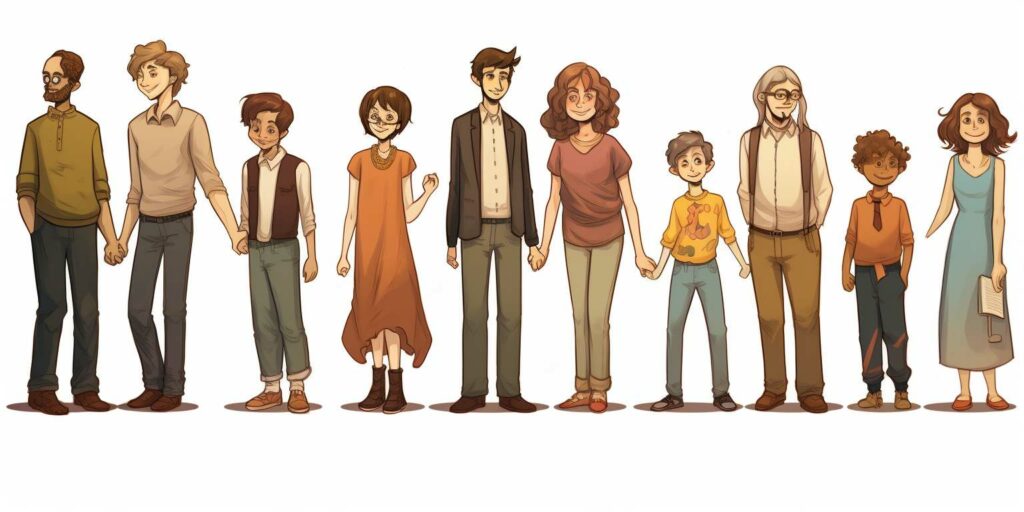There’s something profoundly special about family. It’s the cornerstone of our lives, the bedrock on which we build our identities. Family is that unwavering foundation that remains steadfast, even amidst life’s most tumultuous storms. From teaching us our first words to guiding us through life’s winding paths, it’s hard to overstate just how essential families are in shaping who we become.
Not surprisingly, much of what I am today can be traced back to my own family. They’ve instilled in me a sense of integrity and resilience that has served as my North Star throughout life’s journey. My family taught me the importance of respect, love, and kindness—values I strive to uphold every single day.
The significance of family extends far beyond these personal anecdotes though. Various studies have shown how vital strong familial ties are for mental health and well-being at all stages of life—from childhood right up until old age! So let’s delve into this topic further and discuss why family is so crucial.
The Core Values of Family
Family is more than just a word. It’s a world filled with love, trust, respect, and mutual understanding. Let me dive into some of the core values that make family so integral to our lives.
Love is what binds us all together in the tapestry of a family. It’s an unspoken language that transcends words and actions. No matter how big or small our achievements are, we know there’s always someone at home waiting to share our joy or wipe away tears during tough times.
Trust forms the backbone of any familial relationship. We confide in each other knowing that our secrets are safe within those four walls. When we stumble and fall, it’s this unwavering faith we have in our family members that gives us the strength to get back up again.
A healthy dose of mutual respect goes a long way in maintaining harmony within a family. Understanding individual boundaries and acknowledging each other’s feelings play pivotal roles here.
The ability to communicate effectively can’t be overlooked either. Clear communication prevents misunderstandings and resolves conflicts swiftly ensuring peace reigns supreme at home.
And let’s not forget about support – be it emotional or financial, families always have each other’s backs.
To sum it up:
- Love: Bonds us together.
- Trust: Gives us strength.
- Respect: Maintains harmony.
- Communication: Resolves conflicts.
- Support: Provides reassurance during tough times.
These core values don’t just strengthen familial ties but also shape us as individuals influencing every aspect of our life from personal growth to career choices.
Family: The First School for Children
I’ve always believed that families play a crucial role in the early education of their children. They’re more than just blood ties and shared DNA; they’re our first teachers, imparting essential life lessons before we even step foot into a formal school setting.
Think about it – who taught you to speak your first words or tie your shoelaces? Most likely, it was someone in your family. These seemingly small skills are the building blocks of our personal development, and they often come from home.
- _Speaking: From babbling as babies to forming complete sentences, we learn to communicate effectively through constant interaction with our family members.
- _Social Skills: Families teach us how to behave properly, respect others, express love and handle conflicts – all vital components in socializing.
- _Values & Morals: Our sense of right and wrong is largely shaped by the values our families instill in us at an early age.
According to data from the U.S. Department of Education,
| Number of Parents | |
|---|---|
| Actively involved in their child’s education | 6.7 million |
| Not involved at all | 1.3 million |
Clearly, most parents understand the importance of being actively involved in their child’s early learning process.
On top of these basic life skills and moral teachings, families also provide emotional support during tough times. Childhood can be fraught with challenges and uncertainties; having a supportive family helps kids navigate these obstacles confidently.
In essence, families aren’t just important – they’re irreplaceable educators. So next time you see mom or dad playing ‘teacher’, know that it’s not just fun and games – they’re molding future generations one lesson at a time!
How Family Influences Our Personal Development
The influence of family on our personal development can’t be overstated. I’d go so far as to say it’s the primary architect shaping our emotional, social, and cognitive constructs. It all begins in the nurturing environment a family ideally provides.
Our earliest interactions with family members teach us about relationships, emotions, and effective communication. We learn what’s acceptable and unacceptable behavior within a societal context. Families also foster feelings of security and self-worth that are essential for healthy personal growth.
There are several ways this happens:
- Cognitive Development: The conversations we have at home often stimulate curiosity and thought processes. A simple question about why the sky is blue can ignite interest in science or nature.
- Emotional Development: Emotional intelligence develops through interactions with family members — empathy, understanding emotions, managing feelings — all these come from observing and interacting within a familial setting.
- Social Skills: Learning to share toys with siblings or negotiating an extra half-hour before bedtime cultivates negotiation skills.
In essence, families provide us with a training ground where we learn critical life skills.
Let’s look at some numbers:
| Aspect | Detail |
|---|---|
| Cognitive development | 80% influenced by familial interaction |
| Emotional development | 75% attributed to family dynamics |
| Social skills | 90% learned through sibling interaction |
Remember though, every individual’s experience varies significantly based on their unique familial circumstances. For instance, individuals from larger families may develop advanced social skills sooner due to more opportunities for interaction.
Family also instills values that shape our worldview. What’s perceived as right or wrong is largely framed by early lessons learned within the confines of our homes.
Long story short: while other factors like peer groups and education play important roles in molding us into who we become, one mustn’t underestimate the profound impact of those family dinners or Sunday afternoon board games.
Economic Benefits of a Strong Family Unit
Let’s dive right into how a strong family unit can contribute significantly to the economic stability of individuals and society as a whole. One of the primary ways this happens is through resource sharing. Within a family, resources like housing, food, and transportation often get shared among members.
- Resource Sharing: When families live together, they pool their resources together for common expenses such as rent or mortgage, utilities, groceries and vehicle costs. This joint effort typically results in lower per-person living expenses compared to people living alone or with non-family roommates.
Next up on the benefits list is childcare support. Here’s where grandparents or other family members step in to help with child rearing – an arrangement that saves parents substantial money they’d have otherwise spent on daycare or babysitters.
- Childcare Support: According to Child Care Aware of America’s 2020 report, the average cost of center-based infant care can range from $6,787 to $20,728 per year depending on the state[^1^]. It’s clear then that relatives helping out with childcare can lead to massive savings!
But it’s not just about saving money; having a strong family unit also tends to promote better financial habits which has long term implications.
- Financial Education: Families are usually the first source of financial education for children. Positive financial behaviors learned early – like saving or budgeting – can set kids up for solid financial futures.
Lastly but definitely not least, there’s evidence suggesting that close-knit families may have higher earning power.
- Earning Power: A study published by economists at University College London revealed that men who grew up in stable families earned approximately 13% more by their late 30s compared to those who did not[^2^].
In all these ways and more – be it through resource sharing, childcare support, financial education or increased earning power – a strong family unit can greatly enhance economic stability.
[^1^]: “2020 Price of Care”, Child Care Aware of America.
[^2^]: Paul Gregg, Claudia Vittori and Lindsey Macmillan, “Family income and education in the next generation: exploring income gradients in education for current cohorts of youth”, Oxford Review of Economic Policy, Volume 32, Issue 4, Winter 2016.
Importance of Family in Mental Health Support
I can’t overstate the vital role family plays in supporting mental health. It’s not just about love and companionship, although these are undeniably important. Families offer an essential support system that can help us navigate through life’s toughest challenges, including those related to mental health.
Let’s delve into the statistics for a moment. According to a report by the National Alliance on Mental Illness (NAMI), approximately 1 in 5 adults in the U.S.—43.8 million, or 18.5%—experiences mental illness in a given year. That’s quite a significant number.
| U.S Adult Population | Experiencing Mental Illness |
|---|---|
| 43.8 Million | 18.5% |
In such scenarios, families often become the first line of support, providing emotional comfort and understanding while also helping with practical matters like medical appointments or therapy sessions.
One real-life example comes from my friend Sarah who struggled with severe depression during her college years. She told me how her family was instrumental in her recovery process; they were there throughout – listening without judgment, accompanying her to therapy sessions and simply being present during her darkest hours.
Moreover, our loved ones can often spot changes that we might not notice ourselves – subtle shifts in behavior or mood that could be warning signs of an emerging issue. They’re more likely to encourage us to seek help when we need it most because they care about our well-being.
However, it’s crucial not just for families to be supportive but also informed about mental illnesses so they can provide appropriate help without inadvertently causing harm through misunderstanding or stigma.
To sum it up:
- Families form an integral part of an individual’s support network
- They are often first responders during times of crisis
- Loved ones can detect early signs of trouble
- Knowledge about mental health issues enables families to provide effective support
So the importance of family in mental health support can’t be understated. They’re our safety net, cheering squad, and counsel wrapped into one irreplaceable package. In a world that’s increasingly recognizing the vital importance of mental health, our families remain an invaluable asset in this journey towards better wellbeing.
Role of Family in Society: A Broader Perspective
I can’t stress enough the importance of family in our society. They’re not just a group of people related by blood or marriage, they’re the backbone that holds us together as individuals and communities.
So why does family hold such a pivotal role? Well, to start with, families are the first social units we encounter and they shape our understanding of relationships and interactions. From an early age, we learn from our parents or guardians about love, trust, sharing, compromise – all crucial elements for any successful relationship.
Besides shaping personal relations, families also play a vital role in molding our values and beliefs. These lessons aren’t limited to moral teachings alone; they often extend to societal norms and expectations too. For example:
- How should I treat others?
- What’s my responsibility towards my community?
- How do I handle conflicts?
The answers to these questions largely come from our experiences within our family circles.
Now let me throw some light on another aspect – economic support. Families work as economic units ensuring the survival and growth of its members. Parents provide for their children until they become self-sufficient adults who in turn support their aging parents later in life.
Families also contribute hugely towards mental health stability among its members. Studies have shown that having supportive family ties can help reduce stress levels significantly.
To drive home my point about the significance of families in society, here’s some data:
| Indicator | Importance |
|---|---|
| Emotional Support | Studies show that 78% of people with strong family bonds experience lower stress levels |
| Economic Stability | In US households with two income earners, average household income increased by 10% between 2000 & 2019 |
| Moral Values | Research indicates children brought up in stable families tend to display better ethical behavior |
In essence, families shape us into who we are today – teaching us life skills, providing emotional and financial support, and setting the foundation for our future interactions. It’s clear that without family, society as we know it would be a whole different ballgame.
Why Is It Difficult to Define ‘Family’ Universally?
I’ve often pondered why defining ‘family’ universally is such a complex endeavor. The main reason, I believe, is the sheer diversity in family structures worldwide. Traditional nuclear families, single-parent households, extended families living under one roof – these are just a few examples of how varied family setups can be.
Taking cultural nuances into consideration further complicates things. In some cultures, close friends or mentors could be considered as part of the family unit. To indigenous communities like the Maori people of New Zealand, “whanau” (a term for family) can include several generations and relatives by marriage or adoption.
Let’s take a quick look at types of families across several continents:
| Continent | Common Family Structure |
|---|---|
| Africa | Extended Family |
| Asia | Joint Family |
| Europe | Nuclear Family |
| America | Single-Parent Family |
Another hurdle in universally defining ‘family’ is changing societal norms and attitudes towards relationships and cohabitation. Cohabiting couples who choose not to marry but share their lives together are increasingly common today. Similarly, same-sex couples and parents add another dimension to our understanding of ‘family’.
Moreover, advancements in reproductive technologies have ushered in an era where biological connections aren’t necessary for forming a family unit anymore. Surrogacy and IVF treatments allow individuals or couples – regardless of gender or marital status – to become parents.
So you see, it’s no easy task trying to pin down one universal definition for ‘family’. And perhaps that’s okay because after all, isn’t the beauty of family found within its diversity?
Conclusion: The Integral Role of Family
To wrap it all up, family plays a pivotal role in our lives. It’s not just about sharing the same bloodline or last name. With family, we learn valuable life skills, experience unconditional love and support, and build strong emotional bonds that remain unbroken through thick and thin.
Let’s take a quick recap:
- Life skills: From my first steps to learning how to cook my favorite dish, it was all thanks to my family. They’ve been my initial educators, teaching me essential social skills and values.
- Unconditional love: There are days when I’m at my best but also times when I’m far from perfect. Yet, no matter what happens or how badly I mess up, there’s always this group of people who love me just the same.
- Emotional bond: And let’s not forget the deep emotional connection we share with our families. It’s an irreplaceable bond that offers comfort during tough times and multiplies joy during happy moments.
It’d be remiss of me not to mention that every family is unique. Some might be small while others could span multiple generations living under one roof. You may have single-parent households or those with two moms or dads; some families come together through adoption while others blend due to remarriage.
Yet despite these differences in structure and dynamics, it remains true that having a loving family environment contributes significantly to personal development and overall wellbeing.
In essence, a world without families would be unimaginably different – perhaps less compassionate and more disconnected than ever before. So here’s to celebrating the integral role of families – they’re indeed our treasure troves of happiness!



